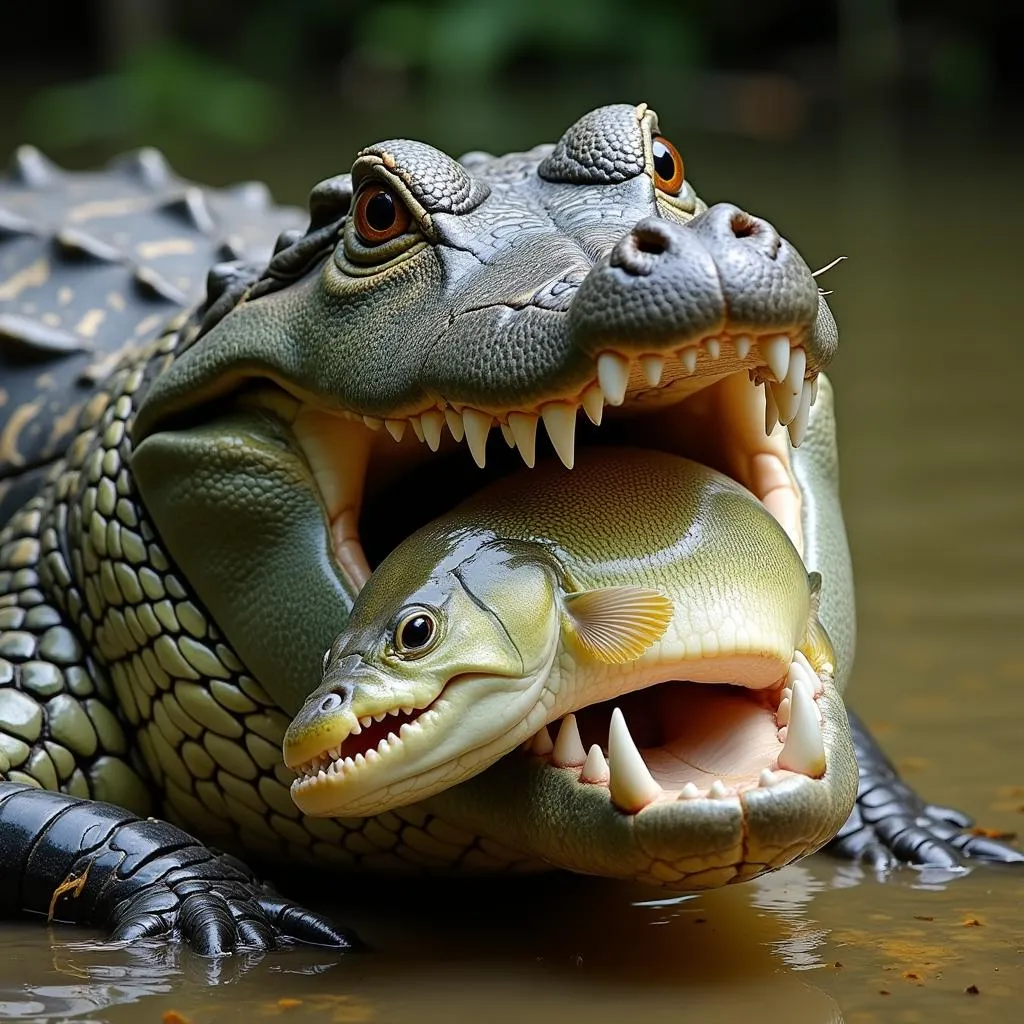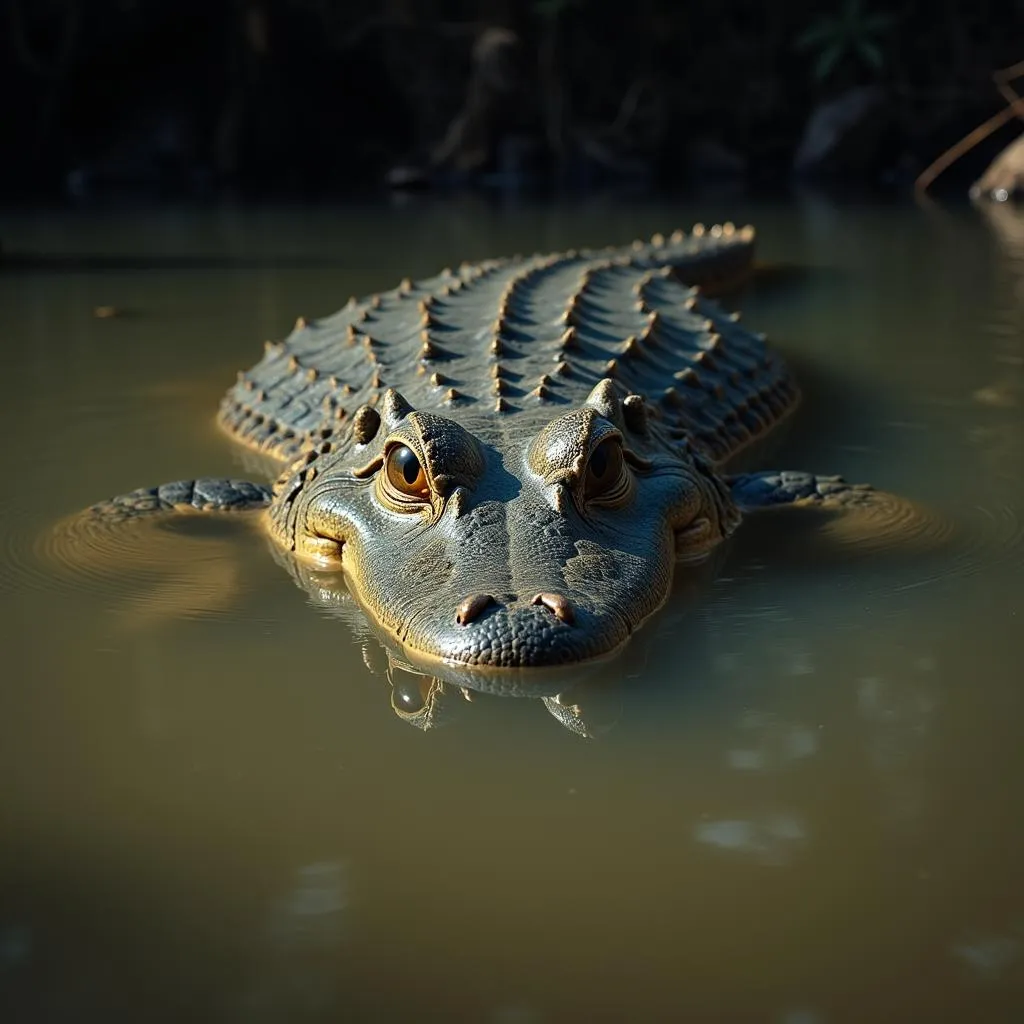African Crocodile Diet: A Look at What These Apex Predators Eat
African crocodiles, masters of their domain, evoke both awe and fear. Their prehistoric presence in the rivers and lakes of Africa begs the question: what fuels these formidable creatures? Understanding the African Crocodile Diet offers a glimpse into their ecological role and the delicate balance they maintain within their habitats.
 Nile crocodile catching fish
Nile crocodile catching fish
More Than Just Meat: Deconstructing the African Crocodile Diet
While often perceived as pure carnivores, the diet of African crocodiles is surprisingly diverse. It varies depending on the species, age, size, habitat, and prey availability. However, one thing remains constant: their status as opportunistic predators, adapting to whatever food sources are abundant.
Young Crocodiles: Starting Small
Juvenile crocodiles begin their lives feasting on insects, small fish, amphibians, and crustaceans. Their smaller size and developing hunting skills necessitate targeting readily available, bite-sized prey.
Adults: A Menu of Opportunity
As crocodiles mature, their diet expands significantly. Adult African crocodiles are apex predators, meaning they sit atop the food chain with no natural enemies. Their menu encompasses a wider range of prey, including:
- Fish: A staple for many crocodile species, fish provide essential nutrients and are often readily available in their aquatic habitats.
- Birds: Wary birds venturing too close to the water’s edge risk becoming a meal. Crocodiles are known to snatch them with lightning-fast ambushes.
- Mammals: From small rodents to larger ungulates like zebra and wildebeest, mammals that come to drink or cross waterways are potential prey. Crocodiles are patient hunters, often lying in wait to ambush thirsty animals.
- Reptiles: Other reptiles, including smaller crocodiles, snakes, and lizards, may also fall victim to larger crocodiles.
- Carrion: Crocodiles are not above scavenging carrion, playing a crucial role in maintaining a healthy ecosystem by consuming dead animals.
The Significance of Diet in the Crocodile World
The diet of African crocodiles is not merely a matter of survival; it plays a vital role in shaping their behavior and influencing the ecosystems they inhabit.
Regulating Prey Populations
As apex predators, crocodiles help regulate prey populations, preventing any one species from becoming overly dominant. This balance is crucial for maintaining biodiversity within their habitats.
Nutrient Cycling
By consuming a variety of prey, including carrion, crocodiles contribute to nutrient cycling. This process ensures the flow of essential elements within the ecosystem, supporting the growth of plants and other organisms.
Fascinating Facts about the African Crocodile Diet
- Powerful Stomach Acids: Crocodiles possess incredibly strong stomach acids, enabling them to digest bones, hooves, and even horns of their prey.
- Infrequent Feeders: Unlike some animals that require frequent meals, adult crocodiles can survive for extended periods without eating. Some species can go months without food, relying on stored energy reserves.
- Feeding Frenzy: When prey is abundant, crocodiles may engage in a “feeding frenzy,” where multiple individuals converge on a carcass, creating a chaotic scene of snapping jaws and churning water.
 Nile crocodile lurking beneath the water's surface
Nile crocodile lurking beneath the water's surface
Understanding the African Crocodile Diet: A Window into Their World
The african crocodile diet provides a captivating glimpse into the lives of these ancient predators. Their adaptable feeding habits, coupled with their status as apex predators, underscore their crucial role in maintaining the delicate balance of Africa’s freshwater ecosystems. By understanding their dietary needs and behaviors, we gain a deeper appreciation for these magnificent creatures and the importance of conserving them for generations to come.
FAQs: Frequently Asked Questions about African Crocodile Diets
- What is the most common food source for African crocodiles? Fish often constitute a significant portion of their diet, but the specific types of fish vary based on location and availability.
- Do all crocodiles eat the same things? No, dietary preferences can differ between crocodile species, with some specializing in particular prey items. For instance, slender-snouted crocodiles primarily feed on fish, while Nile crocodiles have a more diverse diet.
- How often do crocodiles eat? Adult crocodiles can go for extended periods without eating, sometimes months, particularly in colder temperatures or when prey is scarce.
- Why do crocodiles eat stones? Crocodiles swallow stones, known as gastroliths, to aid in digestion. These stones help grind down food in their stomachs, similar to the function of gizzards in birds.
- Are crocodiles dangerous to humans? While attacks on humans are relatively rare, crocodiles are powerful predators and should be treated with caution and respect. It is essential to avoid swimming in areas known to be inhabited by crocodiles and to follow safety guidelines in crocodile-prone regions.
Need More Information?
For further insights into the fascinating world of African wildlife, explore our other informative articles on African Life. Contact us at +255768904061, email us at kaka.mag@gmail.com, or visit us in Mbarali DC Mawindi, Kangaga, Tanzania. Our team is available 24/7 to answer your questions.

